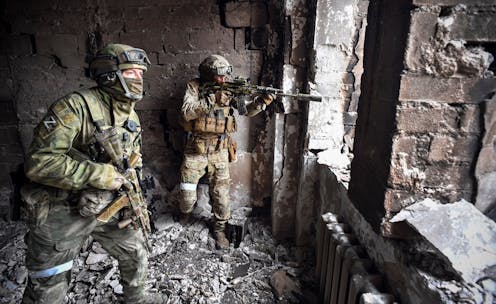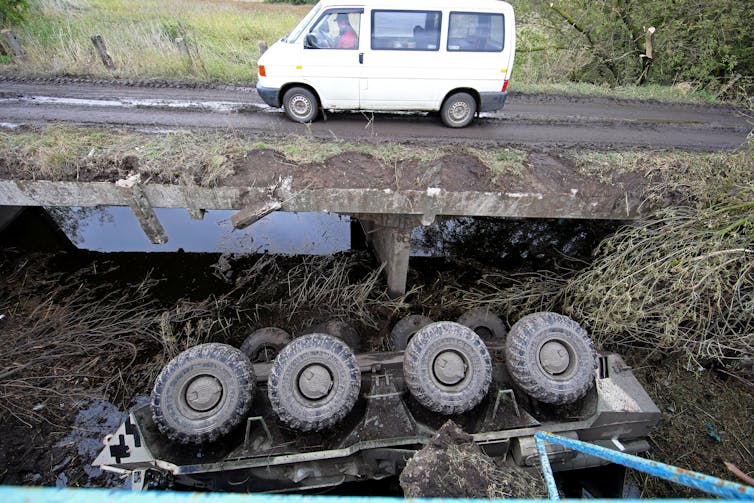
Ukrainian forces are gaining ground in the war against Russia. Since early September 2022, they have launched a massive counteroffensive in Ukraine’s northeast region of Kharkiv, reclaiming large swaths of territory.
The sudden offensive – likely the result of several factors, including effective war gaming and Russian military incompetence – has prompted optimism about Ukraine’s ability to push Russia back from Ukrainian territory.
Russia is now on the defensive in Ukraine’s northeast. And one important dynamic in the lead-up to Ukraine’s counteroffensive was Russia’s growing reliance on private military companies in the war. It’s clear that Russia is increasing its use of these groups, but it’s not known by exactly how much.
Like many other countries, including the U.S., Russia has used private military companies, which are for-profit organizations that provide military services during war, for years. It has increasingly relied on these mercenaries to help fight wars and participate in counterterrorism efforts in places like Syria, Libya and the Central African Republic.
As a scholar who researches private military companies, I think these groups’ increasing visibility in Ukraine reveals the tenuous status of Russia’s military efforts, as well as Moscow’s shaky domestic political situation.
Ultimately, the use of these groups shows that Russia’s manpower shortages have become a liability in its war in Ukraine.

How private military companies work
It’s not a new phenomenon for governments like Russia and the U.S. to use private military companies to help enhance their power during conflict.
These groups, generally speaking, are “conflict entrepreneurs” seeking to profit during war by offering a variety of services to the highest bidders.
Governments are most often the ones contracting these groups to strengthen their war capabilities and assist in a multitude of military tasks, from providing intelligence to fighting in front-line operations. At times, private military companies are used because they are cheaper over the long term, not requiring governments to pay for soldiers’ retirements and health benefits, for example.
In other cases, governments like Russia contract private military companies because their armies either lack enough power to fight a war or because they see strategic value in doing so.
Yet, Russian private military companies – groups like the Wagner Group and similar organizations like Patriot – are somewhat of an anomaly in the larger private security market.
One key reason is that private military companies are technically illegal in Russia. They are only able to operate given their direct connections to the Kremlin.
For example, the Wagner Group – Russia’s most notorious private military company – is bankrolled by a wealthy Russian oligarch, Yevgeny Prigozhin, who has deep ties to the Kremlin. The Wagner Group’s main base in Russia is also shared with Russian special forces units.
Russia’s use of the Wagner Group in Ukraine dates back to when Russia forcibly annexed Crimea in 2014. While the Wagner Group formed around this time, the Russian private military industry has been on the rise since the early 1990s.
Now, the group’s enhanced visibility in Russia’s “special military operation,” as Russian President Vladimir Putin has called it, signals an important shift in the Ukraine war.
Filling a gap for Russian soldiers
Russia’s armed forces have simply been less effective in combat than many expected – a byproduct of poor training, logistics and strategy.
Many Russian soldiers have also been wounded or killed. Overall, “Russians have probably taken 70,000 or 80,000 casualties in less than six months,” Colin Kahl, U.S. undersecretary of defense for policy, said in August 2022.
U.S. military and intelligence community assessments also note that in early August 2022, Russia was losing upward of 500 soldiers per day. Ukrainian officials, meanwhile, reported losing 100 to 200 soldiers per day around this time.
Battlefield losses have put pressure on Putin, who recently ordered more military recruiting in Russia. Russia is trying to add nearly 140,000 new troops to its existing 900,000 active-duty troops by the start of 2023.
In the meantime, Russia’s reliance on private military companies, which were successful in capturing Ukrainian territory where other forces could not, provides the Kremlin with a short-term and partial remedy to its personnel shortcomings.
A cover for Moscow
Moscow employing Wagner Group soldiers also appears to be a politically strategic move.
Private military group fighters, who are often paid better than the regular army, can “allow the Kremlin to assemble more soldiers without upsetting the country’s domestic situation”, meaning political order and support for Putin. It allows Putin to further the false narrative that this is not a war. This is important because the continued loss of Russian soldiers poses political risks to Putin – for example, when dead Russian soldiers come back in body bags from Ukraine.
Putin wants to maintain positive public sentiment about the war and to avoid a draft, which would be very unpopular in Russia. The Kremlin has not elaborated on how it plans to increase its troops without a draft.
Research also shows that people are generally less sensitive to contractor casualties than military personnel dying.
Finally, relying on auxiliary forces like private military companies gives Moscow some potential cover as more independent reports show Russian soldiers have committed human rights abuses in Ukraine.
Research shows that governments can use auxiliary forces like the Wagner Group to deflect responsibility for sexual violence and other war atrocities that happen during conflict.
This is the exact playbook the Kremlin is using in the Central African Republic and Mali, where violence against civilians has soared since Wagner forces arrived to support Russia’s counterterrorism efforts in these countries in 2017 and 2021, respectively.

Caught in the crosshairs
Ukraine accused Wagner mercenaries of murdering civilians in May 2022. German intelligence also intercepted radio communications implicating the Wagner Group in the Bucha massacre in late March 2022.
Wagner’s recent recruitment efforts, which now include dipping into prison populations from dozens of Russian penal colonies, have heightened fears that war crimes will increase, including violence against civilians.
Observers estimate some 7,000 to 10,000 convicts have been recruited since June, and video recently surfaced showing Prigozhin personally appealing to prisoners to join the Wagner ranks. Increasing numbers of criminals and people with limited training joining Wagner will almost certainly impact its operational effectiveness.
However, for the time being – and particularly given Ukraine’s recent counteroffensive – it appears that Russia will continue to rely on Wagner to supplement its armed forces.
This strategy has risks, including exacerbating grievances across the Russian army where morale continues to decline. Such friction may be good for Ukraine’s war effort, but Russia’s continued reliance on private military companies could make the war worse for those civilians caught in the crosshairs.
The views expressed are the author's own and do not necessarily represent those of any U.S. government agency.
This article was originally published on The Conversation. Read the original article.







